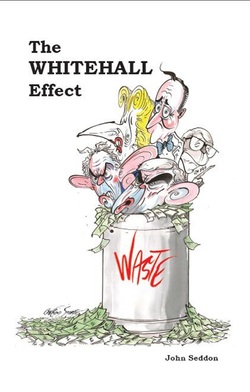The Whitehall Effect ~ John Seddon - Online Notes
|
Links below take you to the chapter notes:
Introduction 1. Prelude Part 1: The industrialisation of public services 2: Call centres 3. Back Offices 4. Shared Services 5. Outsourcing 6. Information Technology Part 2: Delivering services that work Introduction 7. A better philosophy 8. Effective change starts with ‘study’ 9. Better thinking, better design 10. ‘Locality’ working 11. IT as pull, not push Part 3: Things that make your head hurt 12. Targets and standards make performance worse 13. Inspection can’t improve performance 14. Regulation is a disease 15. It’s the system, not the people 16. Incentives always get you less Part 4: ideology, fashions and fads 17. Choice 18. Personal Budgets 19. Commissioning 20. Managing demand 21. Nudge 22. Procurement 23. Risk management 24. Lean 25. IT: features over benefits Part 5 Change must start in Whitehall 26. Beware economists bearing plausible ideas 27. Whitehall is incapable of doing evidence 28. Getting a focus on purpose |
8. Effective change starts with ‘study’
1] John Seddon, 2008, Systems Thinking in the Public Sector: the failure of the reform regime and a manifesto for a better way, Triarchy Press. 2] The subscriber area of the Vanguard Method website provides practical applications of the VM, including video of experts and detailed descriptions of how to conduct ‘check’ and redesign services. View 3] Some people (I call them ‘tool-heads’) will tell you there are 7 types of waste. See here for example. These were derived from the types of waste found in manufacturing organisations. To send someone out to find these types of waste – as is common in tool-head interventions – is a folly. Waste is anything that is not the value work; thinking about it this way you learn about your own types of waste. |

